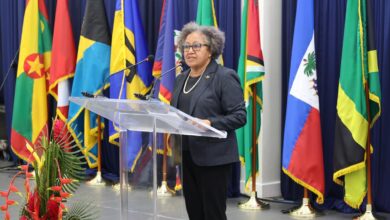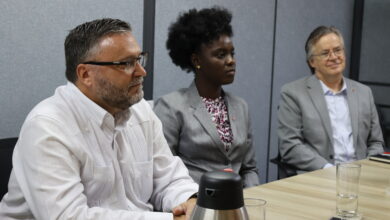I wish as Secretary-General of the Caribbean Community (CARICOM) as I make these remarks to join the preceding speakers in expressing great pleasure in addressing this formal opening ceremony of the 9th Caribbean Week of Agriculture (CWA).
I regret that I was unable to join you for more of the activities this Week given the pivotal role identified for the Agricultural sector in the development of our Community. From what I have been told, I have much to regret. All is not lost, however, as yesterday I was with representatives of the Caribbean Community and of Central America in Trinidad and Tobago discussing the prospect of enhancing trading relations between our two regions, including trade in Agriculture.
CWA, its role and the co-initiators
That said, I must congratulate the organizers of the CWA for having staged an excellent, aptly-themed week of activities. Since its inception some twelve years ago, the CWA has grown to become the premier event on the Agriculture calendar in the Caribbean Region. I am pleased that the Inter-American Institute for Co-operation in Agriculture (IICA) saw it fit to invite the CARICOM Secretariat to join it as of the initiators of this CWA.
For me, it is especially heartening to recognize that this core group for this initiative has been expanded to include the United Nations Food and Agriculture Organisation (FAO) and the Caribbean Agricultural Research and Development Institute (CARDI), two organizations that have been playing crucial roles in the development of the agricultural sector in the Region. I welcome them most heartily.
The nature of the Alliance
This core group plays a major supporting role in what for me is one of the most innovative and dynamic partnerships in this Region – the Alliance for Sustainable Development of Agriculture and the Rural Milieu, for short, “The Alliance”.
And what an Alliance it is! Around the table working for one goal as equals are:
– the political directorate gathered as the Forum of Ministers;
– the youth through the Caribbean Agriculture Forum for Youth (CAFY);
– women through the Caribbean Network of Rural Women Producers (CNRWP);
– the private sector, in the form of the Caribbean Agri-business Association (CABA);
– academia with the Caribbean Council of Higher Education in Agriculture (CACHE); and
– the research arm, the Caribbean Agricultural Research and Technology Network (PROCICARIBE).
If ever our Community needed an example of how stakeholders’ involvement could drive a process, it needs go no further than The Alliance – a living and breathing mechanism worthy of emulation. It is that Alliance that has been the driving force behind CWA and has been active in maintaining the Community’s focus on agriculture.
Another supporter
I would also like to take this opportunity to express the Community’s gratitude to the ACP-EU Technical Centre for Cooperation on Agriculture and Rural Development (CTA). That Organisation has also become a major partner and sponsor of the CWA activities.
Hunger – increasing incidence
Honourable Prime Minister, Honourable Ministers, Distinguished Delegates, ladies and gentlemen, the focus on agriculture as a prime mover in the development of our Community and its peoples, brings into the spotlight the increasing incidence of hunger. Despite the hard work by many politicians, scientists, agronomists, economists, development workers, and others to achieve food security, the global community has still not fully embraced the political and social changes that are necessary to alleviate food insecurity.
As we contemplate this issue in the current period of continuing extreme economic challenges, we must remind ourselves that hunger does not wait on our finding of consensus or signing of agreements. Feeding our people – Heads of Government 2009 initiative The Thirtieth Meeting of the Conference of Heads of Government of CARICOM held in Guyana (July 2009) adopted the Liliendaal Declaration on Agriculture and Food Security which emphasises the following:
1. The importance of agriculture for Food and Nutrition Security and for the development of the economies of the Community;
2. That agriculture should be identified as a priority sector when making approaches to the development Partners of the Region;
3. The firm commitment should be made to allocate the necessary resources to remove or alleviate constraints to the further development of the agriculture sector.
Agriculture – waning macro contribution
The Region’s agriculture sector continues to be an important contributor to its Gross Domestic Product, employment, and foreign exchange earnings. Consequently, it makes a major contribution to the reduction of hunger and the alleviation of poverty, particularly in rural areas. However, be warned, its contribution to that GDP has declined to less than 10 percent in seven Member States. In another seven Member States, its contribution to GDP is greater than 10 percent, and only for three states – Belize, Haiti and Guyana – is it in excess of 20 percent. Those figures however, do not measure the true contribution of agriculture to the economy of the region nor indeed of the individual countries.
Food imports and regional agriculture
Our annual regional food import bill is estimated at US $4billion or approximately 16% of the total import bill for the region. Food represents up to 20% of total imports in some of our countries. With the exception of Guyana and Belize, all of our countries of the Community have a negative food trade balance that rises in some cases to as much as 10% of the Gross Domestic Product. The recent escalation in food prices has certainly not assisted in addressing this challenge.
Forces fuelling rising food prices
Although the exact structure and relationships between the different forces fuelling the food price movements are not clearly defined, it is widely recognized that there are a number of elements to consider in this regard. On the demand side, there is the sustained rapid growth and changing consumption patterns in emerging economies (especially China and India with their vast populations), and speculative investment in agriculture commodities futures markets. On the supply side, there are increased production costs and natural phenomena associated with climate change such as prolonged periods of drought in countries which are major suppliers of grain and wheat, such as Russia and Australia.
The depreciation of the value of the US dollar also represents a negative influence on food prices.
Factors influencing CARICOM States response
In generating our response to the food security challenge we have to take into account the fact that CARICOM countries are Small Island Developing and low lying coastal States. Our economic vulnerability includes, inter alia, high levels of indebtedness, a high degree of openness of the economies, volatility of income due to limited diversification, and high import to export ratio.
Agriculture and Climate Change
Honourable Prime Minister, Honourable Ministers, Distinguished Guests, Ladies and Gentlemen, our countries are extremely vulnerable to climate change. Our location within the Atlantic hurricane belt makes us highly susceptible to increasingly erratic and unpredictable weather patterns which negatively impacts on our own agricultural production.
These issues are particularly important for Caribbean countries as we seek recognition and concessions on the world stage for our peculiar characteristics. And that brings us to the issue of the way forward.
The way forward
In this regard, there are urgent internal actions and critical external initiatives both of which must be proceeded with, on a co-ordinated basis. The Jagdeo Initiative, (named after the Head of Government with lead responsibility for Agriculture in the Quasi-cabinet of the CARICOM Heads of Government, His Excellency Bharrat Jagdeo, President of Guyana,) dealing as it does with the critical binding constraints on regional agricultural development.
This must, however, be complemented by the external measures such as the initiatives typified by the investment and agri-business fora staged over the last two years in CARICOM. If Agriculture is to play its full role of feeding the population, as well as being a base for industry and a support to tourism, initiating action is not enough. There must be follow up and follow through to their final conclusions. In this regard the work of this Alliance is far from complete.
Conclusion: link between CWA and COTED
It is therefore my hope that this week of activities, including tomorrow’s 34th Special Meeting of the Council for Trade and Economic Development (COTED) Agriculture will not only reflect our desire for agricultural health, food safety and security but also yield some of the solutions indispensable for the alleviation of hunger and poverty as we seek to build a prosperous, viable and secure Community for All.
I thank you for the opportunity of making these few remarks.
© 2011 Caribbean Community (CARICOM) Secretariat. All Rights Reserved. P.O. Box 10827, Georgetown, GUYANA.
Tel: (592) 2





